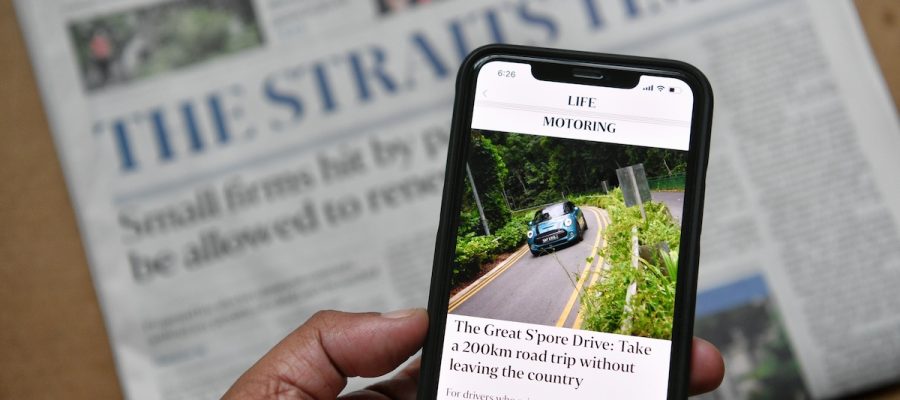
ATHENS • Ms April DeMuth and her partner, Mr Warren Watson, had just finished what they described as the perfect vacation in Greece when they took a coronavirus test at the Athens airport.
They had spent their days sipping coffee on their hotel balcony overlooking the windmills in Mykonos, driving buggies across red sand beaches in Santorini and eating gyros at midnight.
Every detail of their trip ran seamlessly until they were waiting in line for their flight home to South Carolina on Aug 3, when Mr Watson, 51 – who, along with Ms DeMuth, is fully vaccinated – received an e-mail saying he had tested positive for the coronavirus.
“We were in total shock and didn’t know what to do,” Mr Watson recalled. “Then 10 minutes later, we received a call from the Greek authorities telling us they were going to get a van and take us to a quarantine hotel.”
When Europe reopened its borders to Americans in June after a 15-month ban, the highly contagious Delta coronavirus variant was not as prevalent as it is today, and breakthrough infections for the fully vaccinated were rare.
But now, with the Delta strain making up more than 90 per cent of cases in Europe and the United States, stories of travellers catching the virus abroad – including those who are fully vaccinated – are beginning to surface. Their plans have been upended by mandatory quarantine requirements in different countries.
In Athens, Ms DeMuth and Mr Watson were required to spend a minimum of seven days in a quarantine hotel paid for and provided by the Greek government. They were not allowed to leave their room until the seventh day and after testing negative for the virus.
The couple suspect they caught the virus in South Carolina last month before leaving for Greece.
Ms DeMuth had mild cold-like symptoms that passed quickly, and Mr Watson said he felt some drainage at the back of his throat on the way to the airport, but he assumed they were allergy symptoms, which are common for him around this time of year.
Greece does not require fully vaccinated visitors to provide a Covid-19 test before entering the country. Mr Watson did not realise he was probably carrying the virus until the end of their trip.
In hindsight, Ms DeMuth said she would recommend getting a pre-departure test as an extra precaution, even if it is not required by the destination.
-
$2,450 Amount that Ms Louise Little, a 42-year-old personal trainer, spent to extend her Airbnb stay in Spain after she tested positive a day before she was scheduled to fly from Barcelona back home to New York.
When Ms Skylor Bee-Latty, 28, flew from Washington to London in early June to visit her boyfriend, Mr Alex Camp, she had to take four virus tests within 10 days and quarantine for five days before she was free to travel across Britain.
Even then, the vaccinated couple were careful, choosing an isolated location in Wales for their first vacation together in a year.
Days into their trip, they got a notification on a government tracing app, asking them to self-isolate for 10 days because of possible exposure to the virus. They cut their trip short and went back to the city of Manchester, where Mr Camp lives.
After 10 days of isolation at home and multiple negative virus tests, the two were once again free to travel, but they decided to stay in Manchester and enjoy the Euro 2020 championship at pubs. Three weeks later, around July 10, when the Delta variant was surging across Britain, Ms Bee-Latty and Mr Camp started to feel unwell.
“Before we knew it, we tested positive and were back into isolation,” Ms Bee-Latty said.
Many who booked their summer vacations to Europe said they had not considered the consequences of falling sick while on holiday, including the financial setback of having to pay for additional accommodation, food, flight change fees and taking extra time off work.
Most European countries do not cover quarantine accommodations, which can add seven to 21 extra days to a trip, depending on a country’s quarantine mandate.
Last month, Ms Louise Little, a 42-year-old personal trainer, spent US$1,800 (S$2,450) to extend her Airbnb stay in Spain after she tested positive a day before she was to fly from Barcelona back home to New York. She said: “I had no symptoms, and just to think of all the people I had come into contact with during my 10 days’ vacation, I truly feel awful.”
Ms Little had bought travel insurance, thinking it would cover all Covid-19 expenses, but her claim for the extension of her accommodation was rejected on the basis that only medical treatment and hospitalisation were covered.
She said: “I think a lot of people like me who are young, healthy and vaccinated felt invincible, but that’s changed now with the Delta. Travelling has become quite risky again.”
NYTIMES
